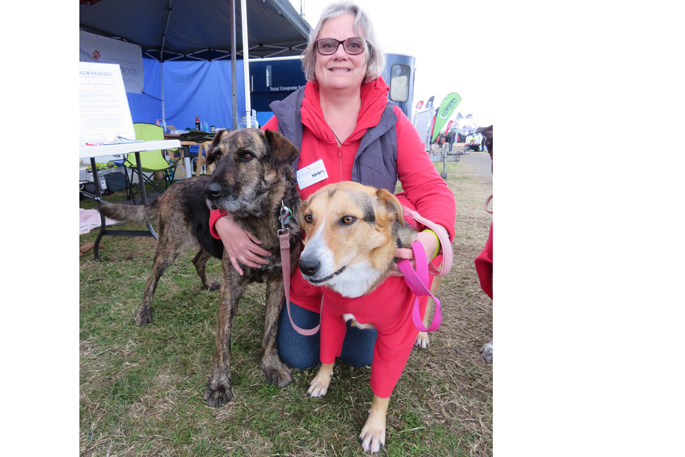A charitable trust that re-homes old, failed or injured working dogs from farms throughout the nation to retire with new families, is trying to set up its network in the Waikato region.
Volunteers from Retired Working Dogs NZ spent four days at Mystery Creek last month – the group’s Fieldays debut – telling farmers of their work re-homing working dogs no longer needed on the land.
RWD fundraiser Karen Cox says their Fieldays stand was to publicise their service to Kiwi farmers – especially those from the Waikato – and also to appeal to would-be adopters.
“We’re here to make farmers aware of our existence – to let them know there is an opportunity to re-home their dogs when they reach the end of their working life.”
Karen says some dogs just don’t like farm work, some get a bit too old for it, some have skills suited to flatter land or smaller properties, while others get injured rendering them unemployable on-farm.
“Sometimes a dog that’s come off the high country, which is no longer in use in that situation, can work on flatter-terrain such as a dairy farm.
“What we do is help farmers to find homes for these dogs – or we take them into our foster homes and find new homes for them ourselves.”
The organisation began in 2012 when founder and president Natalie Smith met Tod, a 12-year-old heading dog who, suffering arthritis from a hard life working the hill country, was on his ‘final’ trip to the vet.
Tod
Instead Tod went home with Natalie, a vet nurse – today RWD is a nationwide movement run by 60 passionate volunteers and a growing network of fosterers.
“In the last year we’ve had nearly 50,000 users on our website with 435,000 page views. We’ve also helped to re-home about 500 dogs. We became a charitable trust last July,” says Karen. “And Tod? He passed away at the grand old age of 17. A great mate, a legend and an inspiration.”
But while RWD has a good presence in the lower North Island it’s trying to expand its operations and presence in the Waikato.
“We really don’t have much coverage in the Waikato at all – so we don’t have the dogs being offered to us by farmers. And we don’t have a foster network established here to support it yet,” says Karen.
“Ideally, we need the foster network set up first – but we also need to get the dogs in. So worst-case scenario is we can take in dogs from the Waikato now – as we have a network of fosterers who’ll drive around the country colleting dogs to take to foster homes.”
Karen says requirements of fosterers are minimal. “Basically, we need homes where the dog can be housed safely and securely, is able to exercise, sleep, and somewhere where they can get used to becoming a pet.”
Re-homing
Re-homing happens in two ways. “Some farmers keep the dog and we advertise to find it a home. Currently, we’re advertising four-five dogs a day on average and, unless, they are particularly old or unwell, they re-home in about a week.
“Alternatively, we may take the dog into foster, especially in cases where surgery or training may be required. In these cases, RWD finds the dog a home after vaccinating, neutering, microchipping and giving it a health-check before it’s rehomed. And we charge an adoption fee to the new owners for those services.”
Karen says there’s about 200,000 working dogs in NZ at any given time. “We want to get established in the Waikato because it’s a big farming region with cattle and working dogs prevalent here.”
To rehome a dog, or become a fosterer or volunteer, see: www.retiredworkingdogs.org.nz Or email: retired.workingdogs@gmail.com or see: https://www.facebook.com/Retired.WorkingDogs



0 Comments
Leave a Comment